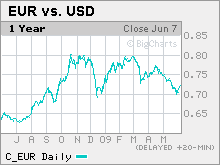Dollar weakens, euro rallies
Investors weigh whether the U.S. central bank might raise interest rates sooner than expected and banks return bailout funds.
NEW YORK (Reuters) -- The dollar ended a two-day winning streak Tuesday, falling against major currencies as investors questioned whether the economy had improved enough to justify talk of higher U.S. interest rates by year end.
The euro rose above $1.40 and sterling also rallied sharply while the U.S. Treasury said 10 of the country's biggest banks could repay $68 billion in taxpayer money received during the height of the credit crisis, boosting hopes the worst is over.
Nonetheless, investors were growing less certain that the Federal Reserve would raise rates in 2009, a view that gained traction last week after data showing a slower pace of U.S. job losses in May boosted the dollar and two-year Treasury yields.
"There's a very trivial chance that the United States will see significant inflation in the next 12 months," said Michael Woolfolk, currency strategist at The Bank of New York-Mellon.
"I fully expect the dollar to trend weaker over the next several weeks unless big problems in Europe develop," he said.
The euro rose to a session peak of $1.4036 before easing to $1.4021, up 0.9%, while sterling added 1.4% to $1.6268 after falling below $1.58 Monday. The dollar fell 0.8% to 97.64 yen.
Stronger-than-expected UK housing data and fading fears of a government collapse lifted sterling, with traders saying the market was relieved to see some members of Prime Minister Gordon Brown's Labour Party offer him their support.
The euro wobbled overnight after a sharp slide in German industrial output suggested the biggest euro zone economy is still facing weak global demand for its goods.
But hope that Latvia, one of the most troubled economies in Eastern Europe, may yet avoid devaluing its currency helped the euro. The Swedish crown also soared against the dollar and euro after Latvia's finance minister said devaluation of the lat was "absolutely out of the question."
Sweden's currency had fallen sharply because of Swedish bank exposure to Latvia's economy, which may shrink by as much as 18% this year.
Earlier, dollar losses were checked when a government official said China, the largest holder of foreign reserves, had no intention of abandoning U.S. dollar assets, adding no one talks about "dumping the dollar."
But overall, investors remained wary of making big bets in favor of the dollar, especially as they rethought the chances of a Fed rate hike this year. Two-year Treasury yields eased to 1.3% on Tuesday after rising above 1.4% on Monday for the first time in seven months.
"Yes, the deterioration in U.S. data has slowed, but to suggest ... the Fed is looking to take back some monetary easing before year-end is somewhat injudicious," said Jeremy Stretch, strategist at Rabobank in London. "It's safe to say that market is getting ahead of itself."
Investors said they were awaiting an auction of three-year Treasury notes on Tuesday and sales of 10-year and 30-year debt this week for a better picture of rate expectations.
The dollar could rebound, however, if the situation in Eastern Europe deteriorates or if other euro zone countries see their sovereign credit ratings cut as Ireland did on Monday, said Dan Cook, analyst at IG Markets in Chicago.
"The market is like a kid learning to ride a bike," he said. "He feels confident as long as the parents hold his shoulders, but if they let go, it could be a different story." ![]()



